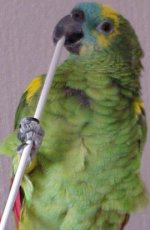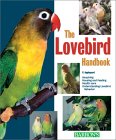The Problem with Bird Mills
Know the Source of Your Bird to Avoid Life-Long Issues
Most of us have seen the sad videos of puppy mills. Hundreds of wretched creatures huddle in too-small cages. Their only purpose in life is to breed, breed, breed with little regard for their health or welfare. However, most people have not been exposed to the avian equivalent, the bird mill. It is very important to know the source of your pet bird, especially if you are adding this new pet to a home that already has other birds.
What Are the Risks?
The most obvious risk is disease. When birds are kept in minimally decent conditions, they are prone to bacterial infections, and even worse, to such deadly viral diseases as psittacine beak and feather disease (PBFD) and polyoma. Bird mills that have overcrowded cages often do not practice any form of quarantine. They will get a dozen new breeder birds from various sources and immediately put them into flights with their current flock. This is a recipe for disaster.
The other risk is that many such birds are raised with substandard methods: poor nutrition, poor socialization, and forced weaning can lead to a life of physical and behavioral problems. Parrots are extremely intelligent and social creatures. Failure to supply the necessary care and socialization during the early months contributes to the growing population of unmanageable (and generally abandoned) older birds.

Blue-Fronted Amazon (Inca)
How Can You Prevent This?
Generally the ordinary person looking for a pet bird does not visit one of these mills. They go to a bird store or bird mart, where they cannot see the original conditions the bird had to endure. However, there are some steps you can take to make sure your birds come from the best source possible. Stores that put quality over quantity are your best choice. Avoid stores that have cages stacked everywhere filled with too many birds. I can remember one particular store I visited that kept large cockatoos in small cages without a single toy. A cage of young African Greys near weaning had merely a bowl of water and a plate of sunflower seeds to nibble on. If you see these sorts of things, you are seeing birds that are most likely not getting the best beginning in life.
The most obvious indication of a pet store’s attitude toward birds is the food they feed them. Don’t visit just once. Visit the store in the morning and in the afternoon. Visit a number of times. Are they feeding fresh foods? One store that I love that specializes in birds serves a big bowl of mixed fresh vegetables every morning. The birds have a bowl of seeds, pellets, and fresh water as well. I’ve noticed that their weaning baby birds get even more variety: cereals, egg food, and more than one type of pellet. These people clearly understand the importance of exposing a young bird to as many foods as possible. When a pet store doesn’t do this, they are not preparing a bird for a healthy life. Some birds will be finicky for years to come if not exposed to a healthy variety of foods when weaning. This store also does not pack their store with hundreds of birds. They have a few large flights with small birds such as finches and canaries. They generally keep about a dozen adult parrots and the same number of baby birds available for sale. Because they have not overwhelmed themselves too many birds, they can keep impeccable conditions and feed each bird as if it is a family member.
How clean is the store? I have visited stores that look like medieval prisons. I have visited stores that are so clean you could perform surgery in them. I certainly would prefer to get my bird from the latter kind of store. What sort of isolation procedures do they practice? Do they trim the wings of clients’ visiting birds right next to a cage of weaning conures? Are unweaned babies kept in a protected area away from visiting or boarding birds? These are important to prevent the spread of disease to vulnerable youngsters. Do they keep food and toys that are for sale in an area of the store that is not filled with cages of birds? I know one store where the open box of millet sits under a row of bird cages. I saw customers picking out their little sprays from among the feathers that had dropped down to the box below. I find this extremely unsettling. I certainly wouldn’t want to take these contaminated millet sprays home to my birds. We have to face the fact that birds can harbor deadly, untreatable viruses. This type of practice shows either ignorance or complete denial.
Ask questions. While most stores will not give out the names of their breeders, they will tell you what they consider when deciding to purchase a bird. By testing the knowledge of the store workers, you also find out just how much they know about birds and their care. Beware of stores where the workers don’t know the difference between two species of conure or lovebird. At one particular nationwide chain a worker actually argued with me that a particular bird was a sun conure; the bird was NOT a sun conure. These types of stores tend to be more business oriented (chains often have this problem) and do not consider such issues as weaning methods, socialization, and species-specific care. While a pet store does have a right to be a business and earn money from their enterprise, it should not be at the expense of these intelligent, feeling creatures. As pet birds become more popular (particularly larger pet parrots), we can expect to see more stores competing. Economic competition for sales (i.e., cheap prices) often means that birds are rushed to be weaned, sometimes many weeks, or in the case of the largest parrots even months, before they should be. This model does not bode well for the future of parrots as pets, but we as consumers can refuse to participate in any system that does not acknowledge the moral and ethical responsibilities of bird breeding. Simply put, do not think you are getting a great deal just because a bird is “cheap.” A more expensive bird from a small, quality operation will be a much better investment in the long run. Their birds often cost more because the sellers spend more time with them and put quality over quantity.
Many birds are a lifetime commitment. Some of the larger parrots live for 60 or more years. Rather than impulse buy the first bird you see, take the time to know your source. Many people have found it is better to buy directly from a breeder rather than a store, but this doesn’t have to be the case. I have bought nice birds from both sources. However, in the case of birds from pet stores, I really take the time to get to know the store owners and make sure they feel the same way I do about these remarkable creatures called birds.









